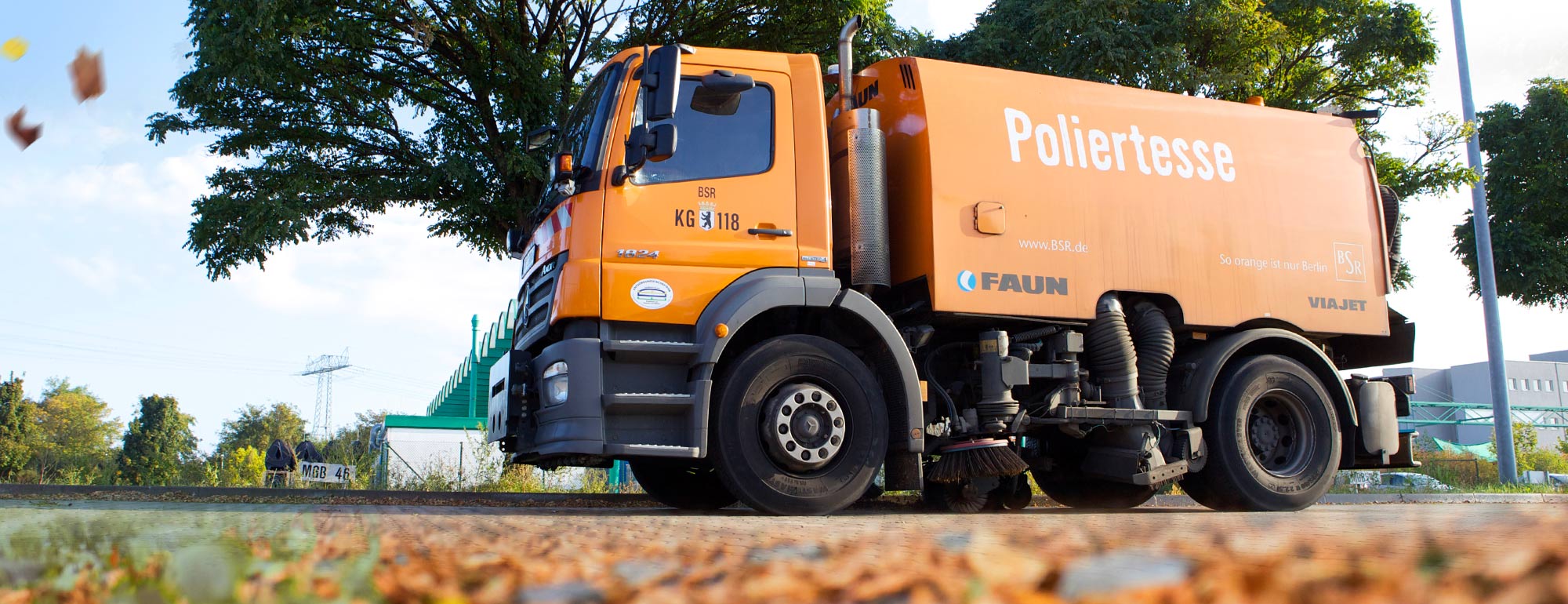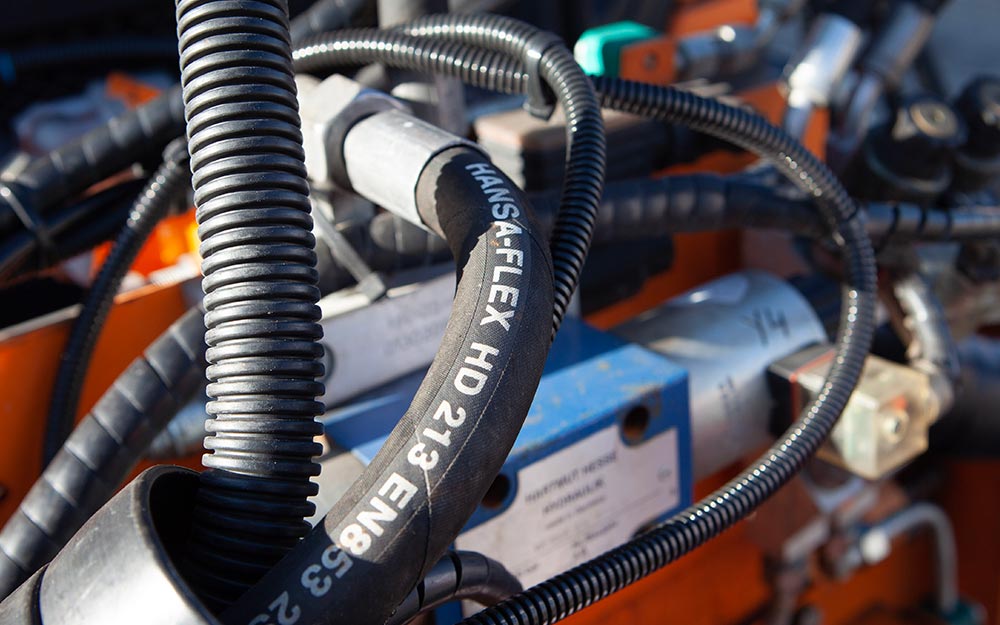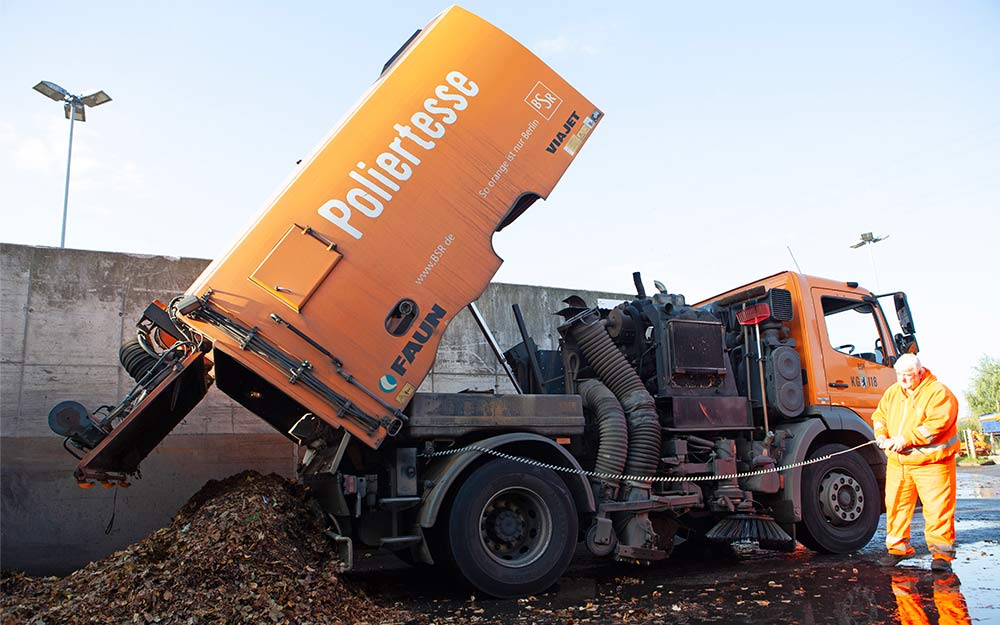BSR is the largest municipal waste disposal company in Germany and one of the 15 largest employers in the German capital.

12.03.2024
Softly whisper the leaves
Berlin is the greenest metropolis in Europe. The streets of the capital are studded with over 400,000 trees. But the same trees that are so resplendent in spring and summer make for a heap of work – literally – in the autumn. Then, the streets and squares are strewn with more than 100,000 cubic metres of leaves. Enough to fill over 3,000 HANSA‑FLEX service containers. Removing this enormous quantity of foliage from the scene is just one of the many tasks of Berliner Stadtreinigung (BSR).
BSR is the largest municipal waste management agency in Germany and one of the 15 biggest employers in the capital. Almost 5,500 men and women are hard at work every day, keeping 4,000 kilometres of roads, footpaths and squares clean and emptying the dustbins from 1.8 million Berlin households. In order to stay on top of this mammoth job, the company also maintains a fleet of over 2,000 vehicles. These include snowploughs and gritters, dustcarts and roadsweepers.
So much work – so little time
But let us return to the leaves: As the nights grow colder in autumn, the tree roots are able to absorb less and less water from the soil. A lot of fluid continues to evaporate through the leaves. Most deciduous trees put a stop to this loss by discontinuing the supply of water to their foliage. The leaves are then no longer able to make chlorophyll, and they turn red, yellow or brown. When the trees divest themselves of their bright raiment in autumn, the people at BSR know that the “great leaf campaign” is upon them. The orange clad employees have to mobilise an enormous amount of equipment in very short order. Because damp leaves on roads, cycle paths and pavements quickly become hazardous. They increase the braking distance for cars, and present a constant risk of slipping for pedestrians, cyclists and motorcyclists.

By hand and machine
So clearing the roads of the brightly coloured leaves as quickly as possible also becomes a question of safety. Wherever possible, BSR sends in the roadsweeping vehicles to collect the leaves. Their job is made much easier if cars are parked at kerbsides and in parking bays. If necessary, movable signs give notice of a temporary parking ban. There are also plenty of places where machines cannot go, and then the leaves have to be swept up by hand. Besides safety, another reason they must be disposed of as soon as possible is to help with pest control. For example, the miner moth is a threat to the health of the roughly 60,000 white-blossomed horse chestnut trees throughout the city. Trees that are infested with this moth lose their foliage as early as July, but the pupae of the tiny pest spend the winter in precisely those leaves. In an effort to stop the spread of this disease, these leaves are gathered up and composted in professional systems at over 55 °C. And so the moth pupae are killed.
Reducing greenhouse gases
In general, protection of the environment and its resources is a very important cause for BSR. In 2007 they were the first German-owned company in the country to enter into a climate protection agreement with the state of Berlin. As part of this agreement, the waste disposal company undertook to reduce its CO₂ emissions by 121,000 tons every year until 2010. With yearly reductions of 130,000 tons, they beat their own ambitious target. In 2011, they entered into another agreement.
The reason for the successful reduction in CO₂ emissions is a highly effective, ultramodern recycling system. With this system, 84,000 tons of greenhouse gases are trapped and recycled in the landfills, which are now all enclosed. Moreover, BSR operates Europe’s most modern waste incineration plant in the suburb of Spandau. In 2011, the plant recovered enough energy from about 523,000 tons of trash to supply over 61,000 households with electricity and 35,000 with heat.
In 2013, a biogas fermentation plant came online. This too relies on the latest technology of its kind. This facility turns about 60,000 tons of biowaste into biogas every year. It is planned in the future to use this gas to power appropriately equipped garbage collection vehicles. As a result, over half of the thousands of kilometres travelled by these vehicles will represent no climatic burden whatsoever. Another opportunity for the future is the hydrothermal carbonation of biogenic waste materials, such as fallen leaves. At 200 °C and 20 bar pressure, the plant creates environmentally friendly biocoal. This process is still being tested.
Daring to embrace new concepts
Die BSR is a true pioneer in climate protection among municipal waste management companies. That is due in no small part to the company’s willingness to try new concepts. Berlin is currently home to the first operational refuse collection vehicle in the world to run on a fuel cell. The hydraulic loading system on this vehicle is powered exclusively by the high-tech cell. Hydraulic systems have been installed in practically all of the vehicles operated by BSR. They lift and lower the dustbins, set the loading surfaces of the refuse tippers upright or move the brushes on the roadsweeping machines.
Waste Disposal with hydraulics
Of course the hydraulics in these vehicles also need regular servicing, and the occasional repair. In two company-owned workshops, BSR employees are responsible for servicing the vehicle fleet. In order to ensure a constant supply of hydraulic parts, the waste management company relies on the services of HANSA‑FLEX AG among others. We supply all products for all aspects of hydraulics from a single source, via the branch in Berlin-Marzahn.Personally, fast and reliable for the greenest metropolis in Europe.
Learn more
- 12.03.2024
Hunting for treasure
Electrocycling GmbH obtains valuable raw materials from electronic wasteFind out more - 12.03.2024
A demolition giant in action
Plannerer Holding AG relies on cooperation with HANSA-FLEX to optimise the 30-metre excavator armFind out more















































